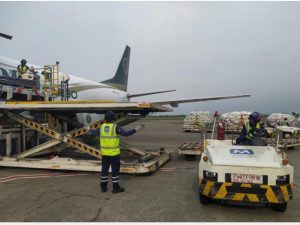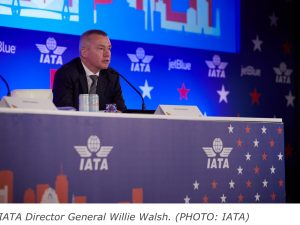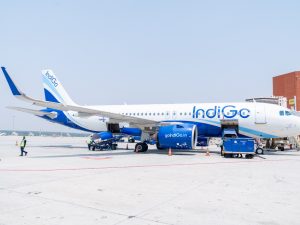Emirates SkyCargo is planning to add new connections between European destinations and the Middle and Far East. It plans to add two further weekly charter freighter services between Milan, Italy, and Southeast China, via Dubai, from the third quarter of this year. It expects fashion goods and pharmaceuticals, as well as general cargo, to be carried on the freighters. Elsewhere, the current weekly freighter service connecting Dubai World Central (DWC) airport, Maastricht Aachen Airport in the Netherlands and Zaragoza Airport in Spain will now also stop in Beirut, Lebanon, before its return to Dubai. General cargo and pharmaceuticals are expected to make up much of the airfreight flown into Beirut on the service out of Maastricht Aachen, while Zaragoza handles significant volumes of fashion goods and apparel, which can now be flown directly to Beirut.
Read More »Menzies Aviation set to acquire Spirit Cargo Handling
Menzies Aviation is all set to acquire Spirit Cargo Handling, an airfreight handler owned by SAS Ground Handling Norway. The acquisition represents the company’s first air cargo operation and warehouse in Norway and will boost Menzies’ overall cargo handling capacity by 150,000 tonnes a year. Much of the cargo handled by Spirit consists of high-demand products like salmon, as well as general cargo, and the work includes handling freighter services. As part of the deal, Menzies will resume responsibility for the Spirit cargo warehouse at Oslo Gardermoen Airport, and for handling existing freighter operations at the airport. Once the deal is completed, Spirit cargo operations will be rebranded as Menzies Aviation.
Read More »India on track to achieve 10MMT milestone by 2030: PM
Today, 3.5 million metric tons of goods are transported by air cargo in India. By the end of this decade, this number will reach 10 million metric tons,” said PM Narendra Modi while addressing the gathering at ongoing IATA’s Annual General Meeting in New Delhi. “These are not just numbers. This is a glimpse of India’s new potential. India is working on a futuristic roadmap to maximize its potential. We are investing in a world-class airport infrastructure. As Mr. Naidu said, by 2014, India had 74 operational airports. Today, this number has increased to 162. Indian carriers have ordered more than 2,000 new aircraft. And this is just the beginning. India’s aviation sector is at a take-off point. It has to make the longest and highest flight. And this flight will not only cross global borders, but will also take the world in the direction of sustainability, green mobility, and equitable access. Friends, the handling capacity of our airports has reached 500 million passengers every year. India is one of the few countries in the world that is setting new standards for user experience through technology. We are focusing on safety, efficiency, and sustainability. We are moving towards sustainable aviation fuels. We are investing in green technologies. We are reducing carbon footprint. We are ensuring the security of progress and the planet.”
Read More »Etihad Cargo unveils SmartTrack to boost efficiency
Etihad Cargo has launched SmartTrack, a game-changing premium service that gives customers real-time access to shipment location and condition data, raising the bar for transparency in global air freight. Unveiled at Air Cargo Europe 2025 in Munich, SmartTrack positions Etihad Cargo as the first carrier globally to implement this type of advanced smart tracking solution. Developed in partnership with Tag-N-Trac, SmartTrack leverages cutting-edge smart label technology to deliver comprehensive end-to-end shipment monitoring. The label is equipped with cellular, GPS, Bluetooth and Wi-Fi connectivity, capturing real-time data on exact location, temperature and humidity, shock, tilt and light exposure. This makes SmartTrack the ideal solution for mission-critical and condition-sensitive cargo, including pharmaceuticals, electronics and high-value goods. SmartTrack is designed with a focus on both efficiency and sustainability. The smart label, which can remain active for up to 30 days, features minimal packaging and eliminates the need for return logistics.
Read More »‘ONE Record will foster cargo efficiency & drive growth: IATA
Willie Walsh, IATA’s Director General, while speaking at the ongoing IATA AGM in New Delhi said, “On the air cargo side, the focus is ONE Record. For too long, aircraft have flown faster than the documentation that accompanies shipments—held back by fragmented systems, outdated processes, and limited data visibility. The current system won’t meet anyone’s expectations as customs requirements evolve and e-commerce volumes surge. The ONE Record global data-sharing standard will be the single accurate and real time source of truth for the entire value chain that built it together. The global rollout starts in January 2026, but to gain the full benefits we’ll be counting on two things: The industry stakeholders who built ONE Record to use it, and Governments to accept ONE Record data in their facilitation processes In a time of growing trade complexity, industry alignment and regulatory support is more critical than ever. Better compliance, cost savings and faster processing are substantial incentives for everyone to make ONE Record work. ”
Read More »Air India records 15% hike in mango exports in April
Air India recorded 15 per cent increase in exports of mangoes this season. Buoyed by increased cargo capacity, in April the airline shipped 1,000 tonnes of mangoes and the volume in May is higher than the previous month, an airline spokesperson said in reports. The UK, the US, UAE, Canada, France, Germany and the Netherlands are the main export destinations. The top varieties exported include Alphonso, Safeda (Banganpalli) and Dussehri, added reports. The official spokesperson said, “In comparison to April 2024, we carried nearly 15 per cent more volume in April 2025. The volume of mangoes transported thus far in May is even higher than the last month, as we moved ahead into the mango season, though with the rains arriving early this year in many parts of the country, the volumes may reduce in the month of June.” Perishables account for around 22 per cent of Air India’s international cargo revenue.
Read More »Indigo, BIAL sign MoU to build MRO facility at BLR Airport
IndiGo has signed MoU with Bangalore International Airport Ltd (BIAL) as part of the airline’s sustained commitment to enhancing its operational capabilities at the Kempegowda International Airport Bengaluru (BLR Airport). Under the agreement, BIAL will allocate around 31 acres of land to IndiGo for development of maintenance, repair and overhaul (MRO) infrastructure to support the airline’s expanding fleet. Thestate–of–the–art facility will be equipped to handle both narrow-body and wide-body aircraft, further strengthening IndiGo’s maintenance capabilities and operational presence at the Bengaluru Airport. Pieter Elbers, Chief Executive Officer, IndiGo said: “Developing broad IndiGo MRO capabilities marks as significant and very strategic step for IndiGo. Partnering with BIAL underlines our shared commitment to drive long-term growth of the aviation ecosystem in Bengaluru and cement its status as, amongst the best and world-class international hubs in India. Together with BIAL, we are further shaping the future of Indian aviation by focusing on innovation, growth and global connectivity that will define India’s leadership in the skies. We see this collaboration as a pivotal step towards building a significant global presence for IndiGo, as well as for India.” Hari Marar, MD & CEO, Bangalore International Airport (BIAL) said: “We are delighted that India’s largest airline, IndiGo, has chosen Kempegowda International Airport Bengaluru (BLR Airport), to set up its latest MRO facility and enhance its operations. We have had a very successful, long-term relationship with IndiGo, and this collaboration further strengthens our association with the airline. This is a strong validation of the growth potential of BLR Airport and the City of Bengaluru as a premier aviation hub. The partnership reinforces our commitment to developing world-class aviation infrastructure and enhancing BLR Airport’s role as India’s premier …
Read More »‘Vehicles must be equipped with high quality seals with unique features, barcodes & GPS’
Sunil Kohli, MD, Rahat Cargo said, “The protection of cargo has been a crucial factor right from its exiting the shipper’s warehouse until it’s handed over to the airlines. The consequences of not sufficiently protecting cargo can be devastating, ranging from financial loss and damaged reputation to long-term, intricate legal disputes. And considering the fact that presently the thieves are highly tech-savvy and constantly developing modern ways and strategies to steal cargo from shippers, it’s essential that the vehicles must be equipped with high quality seals with unique serial numbers, barcodes and GPS for easy tracking followed by strict security protocols and procedures for handling, loading and unloading cargo to minimize the tempering or theft. The custodian of the airport are also expected to install CCTV at the strategic locations apart from keeping strict vigil on the movement and activities by its personnel concerned. The monitoring cell should also be imparted with the related training for proper implementation of security measures.”
Read More »‘Employees are rigorously trained in handling, safety protocols & emergency response’
Mahendra Shah, CMD, V Trans said, “When we handle goods on behalf of our clients, safety becomes our foremost priority. Whether it is surface transportation, express cargo, or warehousing—including our specialised hazardous chemical storage facility, ChemStore—we ensure each consignment is managed with the utmost care and responsibility. We offer clients tailored service levels based on the nature of their cargo, ensuring that every shipment receives the specific attention it requires. Adherence to stringent safety protocols, including MSDS-based checklists, use of Personal Protective Equipment (PPE), Material Handling Equipment (MHE), and regular emergency drills, ensures our teams are well-equipped to handle sensitive cargo and unforeseen challenges safely. Our ChemStore facility is designed in line with global safety standards, offering a secure and compliant environment for storing classified hazardous materials. The facility is backed by advanced infrastructure and a suite of value-added services, making it one of the most trusted chemical storage solutions in the country. With decades of experience in handling industrial cargo—especially chemicals for both large enterprises and MSMEs—our continuous focus on safety, regular team training, and strict process adherence create a culture of reliability and operational excellence. Clients can trust that their goods are in capable hands with V-Trans group.”
Read More »‘Smart control sensors, automation ensure cargo safety in warehouses’
Jinali Gandhi, Director – Global Growth & Expansion, Gandhi Automations said, “Safety is at the heart of all our designs. Our dock levelers have anti-slip checkered platforms and built-in safety features that prevent workers and forklifts from falling off the edge. High-speed doors come with sensors that stop the door if a person or vehicle is detected. Dock shelters create a sealed environment to protect goods from weather, dust, and pests. Additionally, we follow international safety standards in design and installation to minimize the risk of accidents and product damage during loading and unloading. We design our products to grow along with our customers’ evolving needs. A number of our systems are modular in nature, allowing them to be expanded or upgraded over time. Many of our solutions also feature smart control sensors and automation options that can integrate seamlessly with warehouse management systems or existing building infrastructure. For example, our high-speed doors can be connected to sensors and access systems for hands-free operation. Whether a customer is beginning with basic automation or operating a fully smart warehouse, our solutions are built with the flexibility to adapt to future requirements.”
Read More » Cargo Breaking News
Cargo Breaking News









